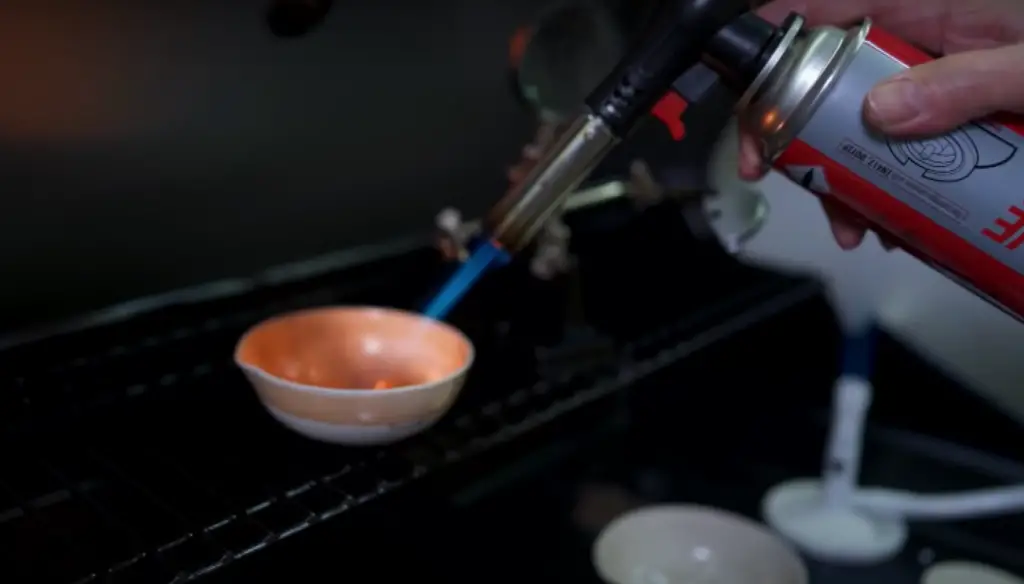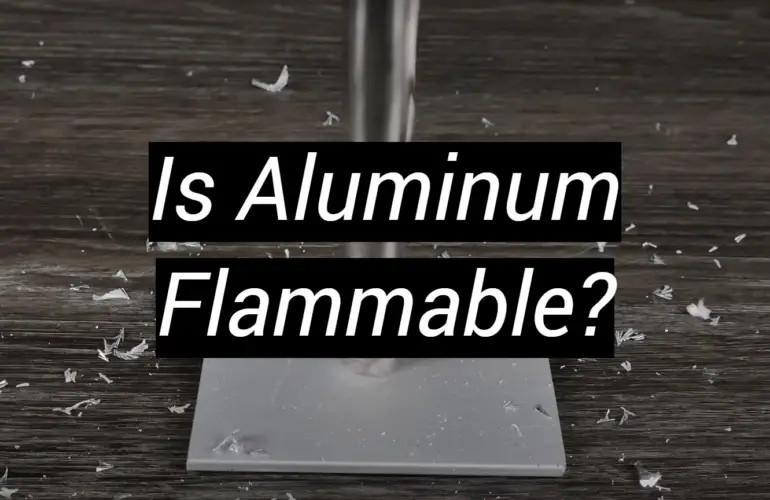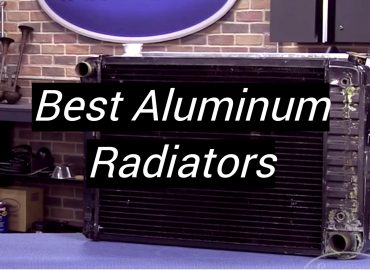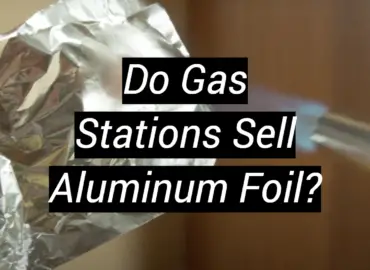Have you ever spent time looking around your home for potential fire hazards and wondered if aluminum things are flammable? It’s an important question to ask, because metal materials can be dangerous when exposed to extreme heat. So today, we’ll take a look at the answer to this common concern – is aluminum flammable? We’ll discuss both why it isn’t likely to catch fire as well as how its flame-resistant properties make it an ideal material for use in many applications. By the end of this post, you should have a better idea of just how safe aluminum is and why it’s such a popular metal of choice in so many areas.
What Is Aluminum?
Aluminum is a silvery-white, lightweight metal that is abundant in Earth’s crust and is derived from bauxite ore. It is malleable, ductile, and can be easily shaped and formed into many products. Aluminum has many applications due to its low density, high electrical and thermal conductivity, durability, strength-to-weight ratio, and corrosion resistance. Common products made from aluminum include window frames, aircraft parts, car bodies, cookware, food packaging materials such as cans or foil wraps. [1]
The Combustion Reaction of Aluminum (Alº)
Aluminum is not a flammable material, meaning it does not catch fire easily. However, while aluminum itself is not flammable, the combination of aluminum and oxygen can result in a combustion reaction that produces heat and light energy. The combustion reaction occurs when oxygen reacts with aluminum at high temperatures to produce alumina (aluminum oxide). This process releases energy in the form of heat and light. The temperature required for this reaction to occur depends on the amount of oxygen present in the environment. Generally speaking, temperatures above 1300°C (2372°F) are necessary for an effective combustion reaction.

Because aluminum has such a low ignition temperature, it is considered too dangerous to store or work with in an enclosed space without proper ventilation and protection.
Taking the necessary precautions when working with aluminum and its alloys will help ensure safety for those in the vicinity of these materials.In conclusion, aluminum itself is not flammable, but combustion reactions involving heat and oxygen can occur with aluminum at high temperatures. It is important to take the necessary safety precautions when handling or storing this material to prevent any accidental ignition sources from igniting the aluminum dust or alloy mixes. This includes wearing proper protective gear and making sure there is adequate ventilation in the area.
Why Is Aluminum Dust Flammable And Bulk Aluminum Not?
Aluminum is not a naturally flammable material. However, aluminum dust can be extremely flammable and has the potential to explode when exposed to heat or an open flame. This is because aluminum particles are small enough that they can easily form a combustible dust cloud. When this happens, the particles become highly charged with static electricity, making them even more susceptible to ignition.
Bulk aluminum does not pose the same risk for fire and explosion as its powdered form. This is because larger aluminum pieces are not able to form dust clouds of fine particles that remain suspended in air; instead, they tend to settle quickly and cannot reach the optimal state required for combustion. Additionally, bulk aluminum does not create large amounts of static electricity, meaning it is less likely to be ignited by a spark or flame. As such, there is no need to worry about bulk aluminum catching fire or exploding.
Overall, while aluminum itself is not flammable, aluminum dust can be highly combustible and should always be handled with caution. To ensure the safety of any area in which aluminum dust may be present, special precautions should be taken to prevent its formation and minimize exposure to sources of heat or ignition. [2]
Some Aluminum Chemical Hazards
Aluminum can be hazardous when it is present in its powder form. This is because the particles are combustible and can react with oxygen, creating a fire or explosion risk. When the aluminum dust comes into contact with an oxidizing agent, such as chlorine, it will become highly flammable and explosive. It is also important to note that aluminum powder can create toxic fumes if exposed to flame or heat.
Additionally, if inhaled, aluminum dust may cause serious lung damage that could even lead to death. For these reasons, it is essential for individuals who are handling aluminum in its powdered form to take proper safety precautions.
In addition to potential combustion risks of aluminum powder, molten aluminum poses a burn hazard.
It is recommended to always wear protective clothing, such as gloves, goggles and a face shield when coming in contact with molten aluminum.It is also important to note that aluminum dust may ignite from static electricity generated by movement or friction in the air. To reduce this risk, the area where aluminum powder is being used should be well-ventilated and kept free of any combustible materials or sources of static electricity.

In conclusion, although aluminum is not flammable in its natural state, it has the potential to become highly flammable when exposed to certain elements or conditions. It is therefore important for individuals who are handling aluminum, especially in its powder form, to take the necessary safety precautions.
Deflagration Venting
It is the process of controlling or eliminating explosions in enclosed spaces. Aluminum and its alloys are generally not flammable, however they can be subject to deflagration venting when exposed to certain conditions. When aluminum and its alloys are heated enough, they become volatile and can ignite an explosive reaction. In order to prevent this from happening, it is important to make sure that any enclosures containing combustible materials are properly ventilated. This will allow for oxygenated air to move through the space and help dissipate heat quickly enough before a potential explosion can occur.
Additionally, proper safety measures such as fire extinguishers should always be kept nearby in case of an emergency. By following these simple steps, you can ensure that your workplace remains safe from potential explosions due to aluminum and its alloys. [3]
Will Aluminum Melt In A Fire Pit?
No, aluminum will not melt in a fire pit. Aluminum has a melting point of 1,220 degrees Fahrenheit (660℃). The highest temperature a regular fire pit can reach is about 800-900 degrees Fahrenheit (426.67-482.22℃). Therefore, aluminum will not melt when placed in a fire pit – it will just become very hot to the touch and may cause burns if handled without proper protective gear. Additionally, aluminum is nonflammable and does not produce toxic fumes when heated, making it safe to use for recreational fires like campfires or bonfires. However, it’s still important to exercise caution when handling aluminum near an open flame, as sparks could ignite nearby flammable materials.
In conclusion, aluminum will not melt in a fire pit due to its high melting point and nonflammable nature. However, it’s important to take the necessary precautions when handling aluminum near an open flame, as sparks may cause nearby materials to catch fire.
What Temperatures Can Aluminum Withstand?
Aluminum is a very strong and resilient metal, known for its ability to withstand extreme temperatures. It has an incredibly high melting point of 660 degrees Celsius (1220 degrees Fahrenheit) – much higher than other common metals like iron or steel which melt at around 1535 degrees Celsius (2795 degrees Fahrenheit). Aluminum can further resist temperatures up to 2000 degrees Celsius (3600 Degrees Fahrenheit) without losing its strength or form. In addition, it also has superior corrosion resistance compared to other metals, making it ideal for outdoor use in many contexts. This combination of high temperature resistance and corrosion resistance make aluminum an excellent choice for durable, long-lasting products that must stand up to the elements.
Therefore, no matter what the temperature might be, aluminum is a reliable and durable metal that can withstand extreme temperatures while still maintaining its strength and integrity. It is an ideal choice for those looking to create long-lasting products that must be able to handle the elements.

Overall, aluminum is highly flammable and should not be used in any situation where it may come into contact with open flames or sparks. However, its remarkable temperature resistance makes it a great choice for many applications in which the temperatures are low enough so as not to cause damage to the material itself. [4]
Does Aluminum Boil?
No, aluminum does not boil. Aluminum has a melting point of 660.32°C (1220.58°F) and a boiling point of 2467°C (4473°F). This means that it will melt but not boil at normal temperatures. Although the melting point is relatively low compared to other metals, its boiling point is much higher and therefore it will only be able to reach a liquid state at very high temperatures before vaporizing into gas.
For this reason, aluminum is often used in fireproof materials as it does not contribute fuel or oxygen for combustion when overheated. In conclusion, aluminum does not boil under normal conditions. However, it can be melted and subjected to burning if exposed to very high temperatures for a long period of time.Why Is Grinding Aluminum Dangerous?
Grinding aluminum is a potentially dangerous activity that requires proper safety precautions. When aluminum is ground, it creates fine dust particles which can be easily ignited and create a fire or explosion hazard. Additionally, if too much force is applied while grinding, the sparks produced could lead to an uncontrolled fire. For these reasons, eye protection must be worn at all times when grinding aluminum and adequate ventilation should also be provided in order to minimize the risk of dust accumulation. Furthermore, flammable materials such as gasoline should not come into contact with aluminum dust or filings. Appropriate personal protective equipment (PPE) such as gloves and respirators should also be worn when grinding aluminum.
By taking all necessary safety precautions during the grinding process, it is possible to reduce the chance of an uncontrolled fire or explosion caused by aluminum dust. However, it is important to remember that aluminum is not flammable in itself; it only presents a risk when ground into dust particles which can ignite easily. Therefore, if grinding aluminum, extreme caution must be taken and all safety measures observed.
Pros and Cons of Aluminum
Aluminum is a versatile and lightweight metal with many uses. It is used in a variety of industries, from aerospace to automotive, and can be found in everyday products such as cans, kitchenware, and electronics. But is aluminum flammable? The answer isn’t straightforward – there are pros and cons to using aluminum that need to be considered.
The Pros: Aluminum has a relatively low melting point which makes it ideal for use in certain applications. Additionally, its non-combustible nature means it won’t spark or easily catch fire like other metals do when exposed to extreme temperatures or sparks. This makes aluminum an excellent choice for certain types of products where safety may be a concern. In addition, aluminum is lightweight and easy to work with, making it a popular choice for many industries.

The Cons: While aluminum may not be flammable in the traditional sense, it can still react with other materials when exposed to high temperatures. This means that if aluminum is used in an application or product where extreme heat could be present, special care should be taken to ensure the material does not come into contact with anything potentially combustible.
Additionally, aluminum does corrode over time due to its reactive nature so proper maintenance is important to keep aluminum products functioning properly and safely.
Overall, aluminum has many benefits but like all metals there are certain risks that need to be considered before using it in any application. Knowing the pros and cons of aluminum can help you make the best decision when it comes to using this versatile metal. [5]
FAQ
Why is aluminum flammable?
Aluminum is not flammable in its solid form. However, aluminum can be melted and become highly combustible when exposed to a sufficiently high temperature. When heated to extreme temperatures, aluminum will react with oxygen from the air to form aluminum oxide, which has the potential to ignite and create a fire. For this reason, it is important to use proper safety procedures when working with molten aluminum or other metals that have similar properties.
What are the risks associated with using hot aluminum?
When exposed to extremely hot temperatures, molten aluminum can burn skin on contact and cause serious injury due to its extremely high heat capacity. In addition, heated aluminum produces harmful fumes that may contain toxic substances such as carbon monoxide. It is therefore essential to work in a well-ventilated area and use protective equipment such as gloves, long sleeves, masks, and eyewear when dealing with hot aluminum.
Are there any special precautions to take when using aluminum?
When working with aluminum or other flammable metals, it is important to follow the standard safety procedures outlined by your workplace or local fire safety regulations. It is also recommended that you keep a fire extinguisher nearby in case of an emergency. Additionally, be sure to check with your local building codes before beginning any project involving the use of heated aluminum.
What happens if you burn aluminum?
Aluminum is actually a poor conductor of heat, so it will not burn or ignite when exposed to open flame. However, aluminum can be oxidized when exposed to high temperatures.

This oxidation process produces aluminum oxide and other compounds which may catch fire and cause burning. It is important to keep aluminum away from extreme heat sources in order to prevent an uncontrolled combustion reaction. Because aluminum has low ignition temperature, it should never be used in welding applications unless specific precautions are taken to ensure the safety of workers and structures nearby.
Is aluminum a combustible metal?
No, aluminum is not considered to be a combustible metal. It has a very low ignition temperature and cannot sustain combustion on its own. Even when exposed to high temperatures, aluminum will only oxidize rather than ignite or burn. As such, it is important to keep aluminum away from any sources of open flame or heat in order to prevent an uncontrolled combustion reaction. In welding applications, special precautions should be taken in order to reduce the risk of fire or explosions near the work area. Additionally, burning aluminum can produce toxic fumes which must be properly vented away from workers and any nearby structures for safety purposes.
Can aluminum be explosive?
No, aluminum is not flammable or explosive. It does not ignite in air at temperatures below 1,220 degrees Fahrenheit (660 Celsius). However, it can become combustible when it is mixed with other materials such as steel and oxygen.

Aluminum powder has been found to be highly combustible when exposed to the right combination of heat and oxygen. In the presence of an ignition source like flame or spark, a reaction can occur that results in an explosion. Generally speaking though, aluminum on its own is non-flammable and non-explosive.
Can aluminum stop fire?
Aluminum can stop fire from spreading, but it cannot extinguish a fire. Aluminum is an effective heat conductor and can help to block the spread of flames by absorbing and dispersing the heat generated by the burning material. This makes aluminum an ideal material for use in flame retardant materials, such as protective coatings and insulation. Additionally, aluminum has flare-proof properties which keep it from flaring up or smoldering even after being exposed to high temperatures or open flame. However, this does not mean that aluminum will put out an existing fire on its own.
Useful Video: Lab experiment reveals the dangers of unsafe flammable cladding | 60 Minutes Australia
Conclusion
In conclusion, aluminum is not considered to be flammable. It has a very low ignition temperature and will only burn at temperatures over 1200°C/2192°F. Aluminum does not react with oxygen easily and therefore is not suitable for combustion. However, if exposed to direct flames or extreme heat, it can become oxidized and can melt or even vaporize if the temperature is high enough. Therefore, it’s important to be aware of the potential dangers when dealing with aluminum in any form. Be sure to practice proper safety protocols when handling hot aluminum objects as well as exercising caution with fires around aluminum products.
References:
- https://firefighterinsider.com/aluminum-flammable/
- https://www.iccsafe.org/building-safety-journal/bsj-technical/the-non-combustibility-of-aluminum/
- https://tamingfires.com/is-aluminum-dust-flammable/
- https://www.shapesbyhydro.com/en/material-science/aluminium-burns-and-other-misconceptions/
- https://www.delfinvacuums.com/en/news/5-dangerous-aspects-about-aluminum-that-every-worker-should-know






